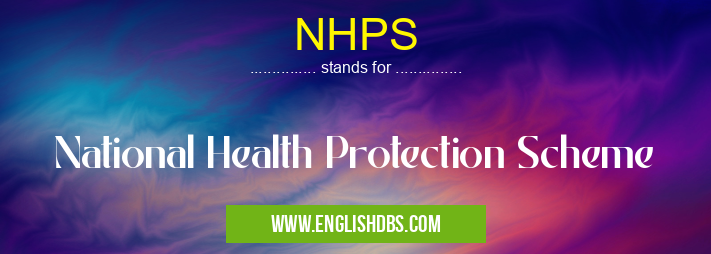What does NHPS mean in HEALTHCARE
NHPS stands for National Health Protection Scheme. This scheme was launched by the Indian Government in 2018 with the aim of providing healthcare support to more than 10 crore vulnerable families, or approximately 50 crore individuals, across India. It is a health insurance program designed to provide financial cover for secondary and tertiary care hospitalisation at various government and private hospitals. In addition to being accessible to those from low-income backgrounds, the scheme is also available for members of certain occupational groups such as agricultural workers, industrial workers, construction workers, and other informal sector workers.

NHPS meaning in Healthcare in Medical
NHPS mostly used in an acronym Healthcare in Category Medical that means National Health Protection Scheme
Shorthand: NHPS,
Full Form: National Health Protection Scheme
For more information of "National Health Protection Scheme", see the section below.
» Medical » Healthcare
Meaning of NHPS
The National Health Protection Scheme (NHPS) provides coverage ranging from Rs 5 lakhs per family per year towards medical expenses incurred during hospitalisation at healthcare providers empanelled under the scheme. The scheme covers most expenses related to treatment in approved government and private hospitals including pre-hospitalisation expenses (up to 30 days prior to hospitalisation), post-hospitalisation expenses (up to 60 days after discharge) as well as diagnostic tests, medicines and other treatments associated with the hospital stay. The NHPS focuses on preventive, curative and palliative aspects of diseases ensuring that families are able to access timely medical assistance without worrying about costs.
Aim of NHPS
The primary goal of NHPS is to reduce the financial burden associated with healthcare services and improve access to quality medical care amongst households from vulnerable backgrounds. By doing so, the scheme aims to ensure equitable access to healthcare whereby all individuals regardless of their economic status are able to access quality medical services on equal terms. This will enable poorer sections of society who otherwise may not have been able get timely treatment due to affordability constraints can now seek better medical aid within their means.
Essential Questions and Answers on National Health Protection Scheme in "MEDICAL»HEALTHCARE"
What is NHPS?
The National Health Protection Scheme (NHPS) is a flagship program of the Government of India, designed to provide financial and medical coverage to over 10 crore Indian families in vulnerable and at-risk socio-economic circumstances. It provides health assurance of up to 5 lakh rupees per family per year for secondary and tertiary care hospitalization.
Who is eligible to be covered under the NHPS?
All citizens of India are eligible to enroll in the NHPS, regardless of income or economic status. Eligibility criteria may vary from state to state and should be confirmed with relevant authorities.
What services does NHPS cover?
The NHPS covers a wide range of secondary and tertiary care hospitalization services including room charges, doctor's fees, nursing costs, tests, medicines etc., up to a maximum annual limit of 5 lakh rupees per family. However, some restrictions such as pre-existing conditions may apply.
How can I avail the benefits of NHPS?
To benefit from the scheme, individuals must enroll themselves by signing up with an authorized insurance provider or through Aadhar based e-registration process available at www.nhpsindia.gov.in After successful enrollment, members can avail free medical treatment at any government hospital that is authorized under the scheme for free or cashless medical treatment. Specific terms and conditions may apply here as well.
Final Words:
In essence, National Health Protection Scheme serves two key purposes – reducing out of pocket expenditure on healthcare services as well as improving equitable access to quality health services across socio-economic groups. This has been lauded by many health experts and activists alike who appreciate how this type of targeted safety net can be instrumental in closing existing gaps between different socio-economic classes while also having a positive impact on overall public health outcomes over time.
